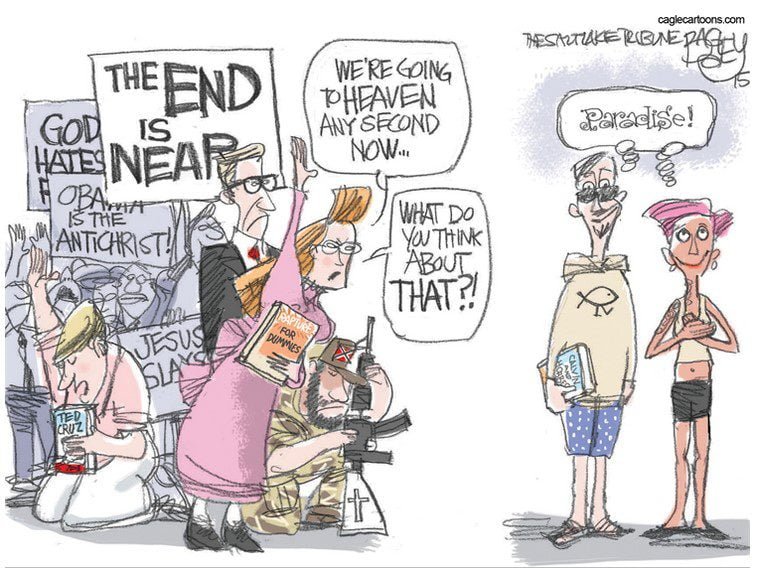
And as he sat upon the mount of Olives, the disciples came unto him privately, saying, Tell us, when shall these things be? and what shall be the sign of thy coming, and of the end of the world? And Jesus answered and said unto them, Take heed that no man deceive you. For many shall come in my name, saying, I am Christ; and shall deceive many. And ye shall hear of wars and rumours of wars: see that ye be not troubled: for all these things must come to pass, but the end is not yet. For nation shall rise against nation, and kingdom against kingdom: and there shall be famines, and pestilences, and earthquakes, in divers places. All these are the beginning of sorrows. Then shall they deliver you up to be afflicted, and shall kill you: and ye shall be hated of all nations for my name’s sake. And then shall many be offended, and shall betray one another, and shall hate one another. And many false prophets shall rise, and shall deceive many. And because iniquity shall abound, the love of many shall wax cold. But he that shall endure unto the end, the same shall be saved. And this gospel of the kingdom shall be preached in all the world for a witness unto all nations; and then shall the end come. (Matthew 24:3-14)
Two thousand years ago, Jesus was hanging out on the mount of Olives. While Jesus sat there, his disciples came to him with a question: what will be the signs of your return to earth and the end of world? While Jesus’s disciples believed that the end of the world was near, as we now know, it’s been twenty-one centuries since Jesus lived and died, with no end of the world in sight. Christians of every generation have looked to the eastern sky, believing that Jesus would return to earth, judge the living and the dead, destroy the heavens and the earth, and make all things new. While Christian eschatological beliefs have changed over time, one constant remains: the end of the world is nigh.
Unbelievers often laugh at and mock Christians who have end-times beliefs. Where is the promise of his coming? non-Christians rightly ask. Christians point unbelievers to 2 Peter 3:3-13:
Knowing this first, that there shall come in the last days scoffers, walking after their own lusts, And saying, Where is the promise of his coming? for since the fathers fell asleep, all things continue as they were from the beginning of the creation. For this they willingly are ignorant of, that by the word of God the heavens were of old, and the earth standing out of the water and in the water: Whereby the world that then was, being overflowed with water, perished: But the heavens and the earth, which are now, by the same word are kept in store, reserved unto fire against the day of judgment and perdition of ungodly men. But, beloved, be not ignorant of this one thing, that one day is with the Lord as a thousand years, and a thousand years as one day. The Lord is not slack concerning his promise, as some men count slackness; but is longsuffering to us-ward, not willing that any should perish, but that all should come to repentance. But the day of the Lord will come as a thief in the night; in the which the heavens shall pass away with a great noise, and the elements shall melt with fervent heat, the earth also and the works that are therein shall be burned up. Seeing then that all these things shall be dissolved, what manner of persons ought ye to be in all holy conversation and godliness, Looking for and hasting unto the coming of the day of God, wherein the heavens being on fire shall be dissolved, and the elements shall melt with fervent heat? Nevertheless we, according to his promise, look for new heavens and a new earth, wherein dwelleth righteousness.
Go ahead and mock, unbelievers, Christians say. Someday, you know, like real, real, real soon, Jesus is going to return to earth and make all things news. On that day, you will wish you were a Christian!
Evangelicals, in particular, see the end of the world as a vindication of sorts. Atheists, agnostics, pagans, and other nonbelievers sigh as Evangelicals prattle on and on about the rapture, the Tribulation, the second coming of Jesus, the millennium, etc. To unbelievers, such things are nonsense. And quite frankly, many Evangelicals believe these things to be absurd too. Oh, with their mouths they profess these things to be true, but how they live their lives tells another story. Evangelicals love their jobs, houses, lands, cars, and material goods as much as the rankest hedonist. Their lives testify to this truth: we really don’t believe that Jesus is coming back any time soon.
Within the broader Evangelical tent are sects, churches, and pastors who really believe that we are living in the end times; that the rapture/return of Christ is imminent. Such people can be found in the highest levels of government. Mike Pence is one such believer. Thinking people should fear True Christians®. It is not beyond them to politically and personally help usher in the end of the world. I used to think that religious beliefs for politicians didn’t matter. However, as I watch the Evangelicals in President Trump’s administration promote and initiate end time policies, I have changed my mind. When Trump recognized Jerusalem as the capital of Israel, millions of Evangelicals had orgasms. People who understand Evangelical eschatology, on the other hand, felt a sense of dread and impending doom. At the time I thought, oh my God, these religious nuts are going to drag us into WWIII, all because they believe a handful of Old Testament Bible verses command them to protect God’s chosen people — Israel — at all costs.
The current Coronavirus pandemic has Evangelicals wondering if it is a “sign” of the end of the world. I began this post with a quote from Matthew 24. Many Evangelicals believe that this passage of scripture is a list of the things that must come to pass before Jesus returns to earth. (and yes, I am quite versed in all the different ways Evangelicals interpret Matthew 24.)
One of the things mentioned is pestilences. Many Evangelicals believe that the current pandemic is a pestilence sent by God; a warning of impending judgment and the end of the world. Of course, Evangelicals have been saying the same thing about all sorts of world/regional events for as long as I can remember. I call this newspaper theology. Every time something bad happens on the world scene, Evangelicals wonder, is this it? Is this the end of the world? Is Jesus coming back today?
Such thinking, of course, leads to all sorts of irresponsible and dangerous behavior. In 1988, Evangelical NASA engineer Edgar Whisenant predicted that Jesus would return between September 1 and September 13. Whisenant wrote a small book titled, 88 Reasons Why the Rapture Will Be in 1988. This book was distributed free of charge to millions of Christians. Whisenant’s book caused such a stir in the church I was pastoring at the time, I had to preach several sermons condemning 88 Reasons. My preached proved futile. The Sunday before the supposed rapture, the church house was filled with people. There was a buzz in the air. I know all of this sounds crazy to non-believers, but make no mistake, people really believed that the return of Jesus was imminent.
Of course, here we are thirty plus years later — no Jesus. There’s not much any of us can do to stop such mania, outside of keeping Evangelicals away from the reins of power and access to the nuclear codes. While President Trump is not, in any appreciable way, a Christian, he is aware that it is white Evangelicals who put him in office. Being the narcissistic political animal that he is, Trump is willing to give Evangelicals virtually everything they want if it means he gets to keep the keys to the kingdom. Some Evangelicals are clamoring for the suspension or cancellation of the November election. In their minds, keeping Trump — God’s chosen leader for the United States — in power is more important than anything, including the Constitution. Scary, I know, but when you think Trump is a modern-day King Cyrus, anything is possible.
Rational people know that Jesus is not coming back to earth. His bleached bones lie buried somewhere on a Judean hillside. What should alarm us is that millions and millions of people believe otherwise; that Jesus was crucified, resurrected from the dead, and returned to Heaven to await the day when his Father tells him to return to earth. These True Christians® are an existential threat, one that threatens to destroy the world. It is in everyone’s best interest that such people are marginalized. It’s time that rational people stop playing nice with believers who have apocalyptic ambitions. When your Evangelical friends on Facebook talk about the Coronavirus pandemic being a sign of the end times, please take them seriously. Many religious beliefs are harmless, cute relics of past human history. However, reading the news and interpreting it in light of the Bible is NOT harmless. People who read the news this way are dangerous, and when gathered together as a religious tribe, they can cause untold heartache and harm. We ignore them at our own peril.
Bruce Gerencser, 68, lives in rural Northwest Ohio with his wife of 47 years. He and his wife have six grown children and sixteen grandchildren. Bruce pastored Evangelical churches for twenty-five years in Ohio, Texas, and Michigan. Bruce left the ministry in 2005, and in 2008 he left Christianity. Bruce is now a humanist and an atheist.
Your comments are welcome and appreciated. All first-time comments are moderated. Please read the commenting rules before commenting.
You can email Bruce via the Contact Form.



